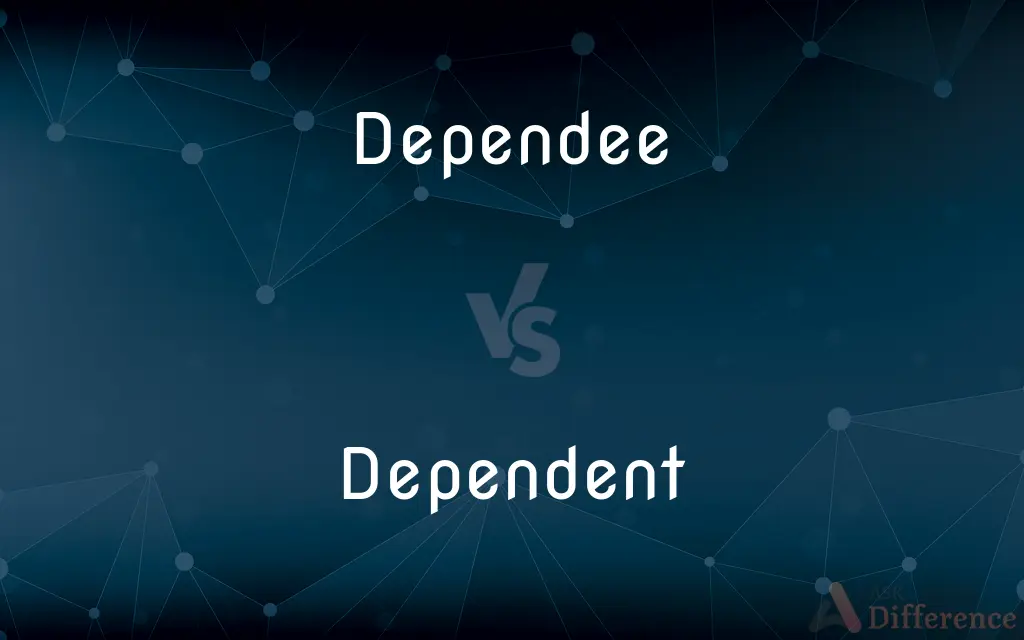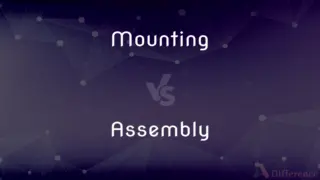Dependee vs. Dependent — What's the Difference?
By Fiza Rafique & Urooj Arif — Updated on March 22, 2024
A dependee is an entity that is relied upon, while a dependent is one that relies on another for support or sustenance.

Difference Between Dependee and Dependent
Table of Contents
ADVERTISEMENT
Key Differences
Dependee refers to a person, organization, or system that provides support, resources, or services, making them the source upon which others rely. It's the entity that holds the necessary components or capabilities that others need. For instance, in a software context, a library or service that other applications use is considered a dependee. Dependent, conversely, describes an entity that requires assistance, support, or resources from another to function, survive, or succeed. This term often applies to individuals who rely on others for financial support, but it can also refer to systems or components that need external resources to operate.
In relationships, whether personal, financial, or technological, the roles of dependee and dependent are complementary. The dependee provides what the dependent requires. For example, in a family, parents are typically the dependees providing for their children, who are the dependents. Similarly, in technology, a software application (dependent) may require a specific library or service (dependee) to function properly. These roles highlight the interconnectedness of systems, individuals, or components, emphasizing the flow of support or resources from one to another.
Understanding the distinction between dependee and dependent is crucial in various fields, including software development, economics, and social sciences, as it helps clarify the direction of reliance or support within a relationship. For example, recognizing a software component as a dependee helps developers understand its importance and the implications of its failure on dependent systems. Similarly, identifying dependents in a family structure is essential for planning and support.
The dynamic between a dependee and a dependent can change over time or context. A child who is a dependent in a familial context may become a dependee if they grow up to provide support to their parents. In technology, a system that is currently a dependent on a particular service could be redesigned to become a dependee by offering functionalities that other systems rely on. This fluidity underscores the importance of understanding both concepts and their application in various contexts.
In any system or relationship, balancing the needs of the dependee and the dependent is key to ensuring stability and sustainability. Effective management involves ensuring that dependees have the capacity to provide for their dependents and that dependents have access to the resources or support they need. This balance is crucial in fields ranging from family dynamics to software architecture, highlighting the universal relevance of these concepts.
ADVERTISEMENT
Comparison Chart
Definition
An entity that is relied upon for support or resources
An entity that relies on another for support or sustenance
Role in Relationship
Provider or source of support
Receiver of support or resources
Examples
Parents in a family, a software library or service
Children in a family, a software application
Importance
Essential for providing necessary components or capabilities
Requires external resources or support to function
Dynamic
Can become dependents in different contexts or over time
Can become dependees by offering support or resources
Compare with Definitions
Dependee
An entity that provides support or resources upon which others rely.
The cloud service acts as a dependee for numerous applications.
Dependent
A component or system that needs external assistance to function.
The mobile app is dependent on the cloud service for data storage.
Dependee
A system or component that offers functionalities needed by others.
The database server is a crucial dependee for the app's backend.
Dependent
A receiver of aid in a dependency relationship.
As a student, he is a dependent on his scholarship for tuition fees.
Dependee
An entity that holds capabilities essential for the operation of dependents.
The power grid is the dependee for homes and businesses in the city.
Dependent
An entity that cannot operate independently without external resources.
The garden plants are dependent on the irrigation system for water.
Dependee
The source or provider in a dependency relationship.
As the main breadwinner, she is the dependee within her family.
Dependent
An entity that requires support, resources, or sustenance from another.
Young children are dependents needing care and financial support from their parents.
Dependee
The object of reliance in a support system.
In project management software, the task management feature is a key dependee.
Dependent
An individual who relies on another for financial support.
She filed her taxes including her elderly mother as a dependent.
Dependee
(programming) An agent that is depended on by a depender, the target of a dependency (used in agent-oriented programming)
Dependent
Contingent on or determined by
The various benefits will be dependent on length of service
Dependent
Requiring someone or something for financial or other support
An economy heavily dependent on oil exports
Households with dependent children
Dependent
(of a clause, phrase, or word) subordinate to another clause, phrase, or word
A clause dependent on another clause
Dependent
Variant spelling of dependant
Dependent
Determined, influenced, or controlled by something else.
Dependent
(Grammar) Subordinate to another clause, phrase, or word.
Dependent
Relying on or requiring the aid or support of another
Adult children who are still dependent on their parents.
Dependent
Needing to continue use of a drug or other substance or engagement in a specific activity in order to avoid experiencing withdrawal symptoms
Dependent on alcohol.
Dependent
(Archaic) Hanging down.
Dependent
Also de·pen·dant One who relies on another, especially for financial support.
Dependent
Relying upon; depending upon.
At that point I was dependent on financial aid for my tuition.
Dependent
(statistics) Having a probability that is affected by the outcome of a separate event.
Dependent
Used after a particle (with one or two exceptions), such as those which express questions, subordinate clauses, and negative sentences.
Dependent
(medicine) Affecting the lower part of the body, such as the legs while standing up, or the back while supine.
Dependent
Hanging down.
A dependent bough or leaf
Dependent
(US) One who relies on another for support
With two children and an ailing mother, she had three dependents in all.
Dependent
(grammar) An element in phrase or clause structure that is not the head. Includes complements, modifiers and determiners.
Dependent
(grammar) The aorist subjunctive or subjunctive perfective: a form of a verb not used independently but preceded by a particle to form the negative or a tense form. Found in Greek and in the Gaelic languages.
Dependent
Hanging down; as, a dependent bough or leaf.
Dependent
Relying on, or subject to, something else for support; not able to exist, or sustain itself, or to perform anything, without the will, power, or aid of something else; not self-sustaining; subordinate; - often with on or upon; as, dependent on God; dependent upon friends. Opposite of independent.
England, long dependent and degraded, was again a power of the first rank.
Dependent
Conditional; contingent or conditioned. Opposite of unconditional.
Dependent
Addicted to drugs.
Dependent
One who depends; one who is sustained by another, or who relies on another for financial support or favor; a hanger-on; a retainer; as, a numerous train of dependents.
A host of dependents on the court, suborned to play their part as witnesses.
Dependent
That which depends; corollary; consequence.
With all its circumstances and dependents.
Dependent
A person who relies on another person for support (especially financial support)
Dependent
Not independent;
Dependent children
Dependent
Contingent on something else
Dependent
Of a clause; unable to stand alone syntactically as a complete sentence;
A subordinate (or dependent) clause functions as a noun or adjective or adverb within a sentence
The main (or independent) clause in a complex sentence has at least a subject and a verb
Dependent
Being under the power or sovereignty of another or others;
Subject peoples
A dependent prince
Dependent
Addicted to a drug
Common Curiosities
Can the roles of dependee and dependent change?
Yes, the roles can change over time or depending on the context, as entities may shift between being a dependee and a dependent.
How do dependee and dependent relate to each other?
The dependee and dependent have a complementary relationship, with one providing what the other needs.
How is a dependee important in a system?
A dependee is crucial as it provides the necessary support, resources, or functionalities that the dependents require to operate or survive.
What is a dependee?
A dependee is an entity that others rely on for support, resources, or services.
What is a dependent?
A dependent is an entity that needs assistance, support, or resources from another entity to function or thrive.
Can a system have multiple dependees and dependents?
Yes, complex systems often involve multiple dependees and dependents, highlighting interdependencies within the system.
Are dependee and dependent terms only used in human relationships?
No, these terms are applicable in various fields, including technology, economics, and social sciences, to describe entities in a support or reliance relationship.
Is financial support the only form of dependency?
No, dependency can involve various forms of support, including emotional, technological, and logistical support, among others.
How does understanding these roles benefit project management?
It helps in planning, resource allocation, and risk management by identifying which components or individuals are critical for success.
What factors determine an entity's role as a dependee or dependent?
Factors include the entity's ability to provide support or resources (dependee) or its need for external support (dependent).
Share Your Discovery

Previous Comparison
Mounting vs. Assembly
Next Comparison
Accolade vs. EulogyAuthor Spotlight
Written by
Fiza RafiqueFiza Rafique is a skilled content writer at AskDifference.com, where she meticulously refines and enhances written pieces. Drawing from her vast editorial expertise, Fiza ensures clarity, accuracy, and precision in every article. Passionate about language, she continually seeks to elevate the quality of content for readers worldwide.
Co-written by
Urooj ArifUrooj is a skilled content writer at Ask Difference, known for her exceptional ability to simplify complex topics into engaging and informative content. With a passion for research and a flair for clear, concise writing, she consistently delivers articles that resonate with our diverse audience.















































